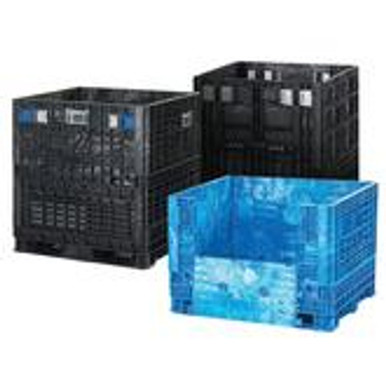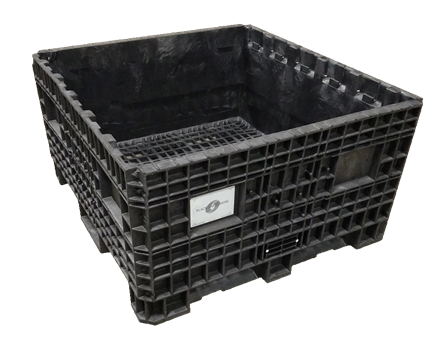The Ultimate Overview to Selecting the Right Bulk Containers for Your Business Demands
Selecting the appropriate mass containers is critical for any type of service that counts on effective logistics. Numerous sorts of containers exist, each created for certain products and applications. Aspects such as dimension, product compatibility, and governing standards play a significant role in this decision-making process. Understanding these aspects can result in boosted operational performance. Several companies neglect necessary aspects that could enhance their general efficiency and sustainability. What are these factors to consider?
Recognizing Different Sorts Of Mass Containers
Bulk containers function as important devices for businesses looking for reliable storage and transport options. These containers come in different types, each developed to fulfill specific operational requirements. One usual kind is the intermediate mass container (IBC), which is optimal for granulated and liquid materials, supplying a balance of ability and ability to move. One more prominent alternative is the mass bag, or FIBC, ideal for dry, flowable items. These adaptable containers are light-weight and can be easily delivered and saved. For larger products, stiff mass containers are frequently employed, providing toughness and security for risk-free handling. Furthermore, there are specific containers tailored for unsafe materials, ensuring conformity with security laws. Comprehending the unique qualities of these mass container kinds allows organizations to make enlightened choices that enhance logistics and reduce prices. By selecting the appropriate container, firms can enhance their operational efficiency and streamline their supply chain processes.
Secret Material Considerations for Mass Containers
When choosing bulk containers, it is necessary to consider the materials utilized in their building and construction. Aspects such as strength, chemical, and durability compatibility play an essential duty in making certain the containers fulfill specific functional demands. Additionally, weight and portability worries can impact both effectiveness and transportation logistics.
Material Durability and Toughness
Sturdiness and toughness are crucial consider choosing materials for bulk containers, as they straight influence the container's capability to stand up to various ecological problems and handling processes. Materials such as high-density polyethylene (HDPE), polypropylene, and stainless-steel are frequently preferred for their robust homes, offering resistance to impact, temperature level, and abrasion changes. The option of product likewise influences the general life expectancy of the container; more powerful products generally result in much less regular substitutes, causing set you back financial savings with time. In addition, the weight of the material can influence delivery expenses and ease of handling. Organizations need to consider their details functional atmospheres and the potential for wear and tear to ensure peak longevity and stamina in their bulk container selection.
Chemical Compatibility Aspects
Recognizing chemical compatibility is necessary for selecting bulk containers, as the products used should resist the particular materials they will hold. Different aspects influence compatibility, consisting of the chemical nature of the components, temperature level, and duration of storage. As an example, corrosive chemicals may call for containers made from stainless steel or specialized plastics that withstand deterioration. Furthermore, reactive substances can create warm or gases, requiring vented or pressure-rated containers. The option of container product, whether polycarbonate, steel, or polyethylene, must line up with the chemical residential or commercial properties of the saved materials to avoid leakages or violations. Eventually, a thorough assessment of these compatibility variables assures risk-free handling and storage space, safeguarding both employees and the atmosphere while maintaining product honesty.
Weight and Mobility Concerns
Choosing bulk containers includes not only reviewing chemical compatibility yet also taking into consideration weight and transportability. Organizations should examine the simplicity of handling and transportation to maximize effectiveness. Light-weight products like high-density polyethylene (HDPE) or aluminum can promote much easier activity and minimize shipping expenses. Alternatively, much heavier containers may provide enhanced durability however can impede wheelchair, especially in environments calling for frequent relocation. Furthermore, the layout of the container should enable for hassle-free lifting and stacking, making sure ergonomic safety for employees. Firms ought to also consider the framework available for transportation; for example, containers suitable with forklifts or pallet jacks can simplify procedures. Ultimately, the ideal equilibrium in between weight and transportability straight influences functional efficiency and expense performance.
Sizing Your Bulk Containers for Optimum Effectiveness
When sizing bulk containers, businesses should thoroughly assess the dimensions called for to fit their particular items. Additionally, weight capacity is an important factor that affects performance and safety and security throughout transportation and storage space. Effective sizing reference not just optimizes room however likewise maximizes operational workflows.
Figuring Out Container Capacities
Selecting the best dimensions for bulk containers is important for optimizing effectiveness in storage and transport. Companies need to examine their particular requirements, taking into account aspects such as readily available room, the nature of the products being saved, and the methods of transport utilized. Accurate measurements ensure that containers fit ideally in cars and storage facilities, reducing thrown away space and decreasing taking care of time. Criterion sizes can supply benefit, however custom-made measurements may be necessary for distinct demands or to fit details products. Furthermore, it is essential to review stacking abilities and access, as these variables affect overall functional efficiency. Eventually, the right measurements result in improved company and streamlined logistics, profiting the total efficiency of business.
Weight Capacity Considerations
Recognizing weight ability is essential for companies intending to optimize their mass container performance. The weight capability of a container directly influences storage space capabilities, transport logistics, and total operational prices. Picking containers with the suitable weight restrictions ensures that companies can safely store and transport their items without running the risk of damages or conformity concerns. Straining containers can result in architectural failures, while underutilizing capability lead to thrown away sources. When picking containers, it is important for companies to analyze their product weights and consider any kind of regulative needs. Additionally, factors such as the sort of material, planned use, and environmental conditions should also influence weight ability decisions. By evaluating these aspects, services can improve effectiveness and guarantee a streamlined supply chain.
Regulatory Compliance and Safety Specifications

Regulatory compliance and safety criteria play a vital role in the option of bulk containers for businesses. Organizations should assure that their containers satisfy different regulations established by local, nationwide, and global authorities. These criteria often relate to material security, structural integrity, and proper labeling, which aid prevent mishaps and guarantee the secure transport of products.
In addition, adherence wikipedia reference to industry-specific standards, such as those from the Food and Drug Administration (FDA) or the Occupational Safety and Health And Wellness Management (OSHA), is essential for business handling unsafe products or foodstuff. Non-compliance can lead to penalties, lawful concerns, or damages to a business's credibility.
Businesses ought to also consider the container's compatibility with the products being saved or carried to stay clear of contamination or chain reaction (refurbished bulk containers). To sum up, recognizing and carrying out regulative compliance and security requirements is vital for the efficient and accountable use bulk containers
Sustainability Options for Eco-Friendly Mass Containers

Business are likewise discovering choices made from recycled products, which not just save resources but likewise sustain the recycling market. Additionally, developments in design permit lighter containers that require much less power to transport, further boosting sustainability. By integrating these eco-friendly bulk container alternatives, organizations can show their dedication to environmental stewardship while fulfilling customer demand for lasting techniques. This shift not only helps the planet yet can also improve brand name track record and client commitment.
Cost-Effectiveness and Budgeting for Mass Containers
While numerous services concentrate on sustainability, cost-effectiveness remains a crucial aspect when choosing mass containers. Organizations must examine the preliminary purchase price, along with long-term functional expenses, to assure monetary viability. Factors such as reusability, upkeep, and resilience play a considerable function in determining general expenditures.
Investing in top notch containers might produce higher in advance prices but can bring about cost savings via reduced replacement rates and reduced waste. In addition, businesses ought to take into consideration transport costs and storage effectiveness, as these can affect the overall spending plan.

Often Asked Questions
How Do I Figure Out the Right Container for Hazardous Materials?
To determine the ideal container for unsafe products, one have to evaluate compatibility with the material, think about the container's product, check for regulative compliance, and analyze capability and security features to guarantee proper handling and storage space.
Can Mass Containers Be Customized for Particular Products?
Yes, bulk containers can be tailored for details products. used collapsible bulk containers. Numerous functions, such as style, dimension, and product, can be customized to satisfy unique demands, making certain suitable safety and security and efficiency for transferring and keeping different goods
What Is the Average Life-span of Various Mass Container Types?
The average lifespan of mass container kinds differs; plastic containers last 5-10 years, metal containers 10-20 years, and wood containers commonly last 3-7 years, depending upon usage, maintenance, and ecological problems.
Exactly how Should I Clean and Maintain Mass Containers?
To clean and keep a knockout post bulk containers, one ought to frequently evaluate for damage, get rid of residue, clean with proper cleaning agents, rinse extensively, and assurance proper drying prior to storage. Following producer guidelines improves long life and security during usage.
Are There Rental Options for Mass Containers Available?
Yes, countless companies supply rental options for mass containers, offering flexibility for companies. These rentals can suit different demands, permitting companies to take care of stock efficiently without the dedication of purchasing containers outright.
Durability and stamina are important aspects in picking materials for mass containers, as they directly influence the container's ability to hold up against numerous ecological problems and dealing with processes. Understanding chemical compatibility is crucial for selecting bulk containers, as the products used should stand up to the specific compounds they will certainly hold. Recognizing weight capability is essential for services aiming to maximize their bulk container performance. Regulatory compliance and safety requirements play an important duty in the choice of mass containers for businesses. While lots of businesses concentrate on sustainability, cost-effectiveness continues to be a vital aspect when choosing mass containers.